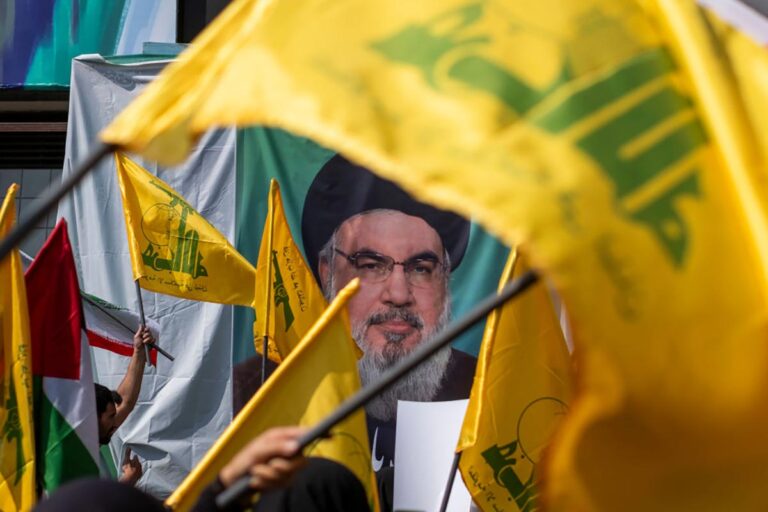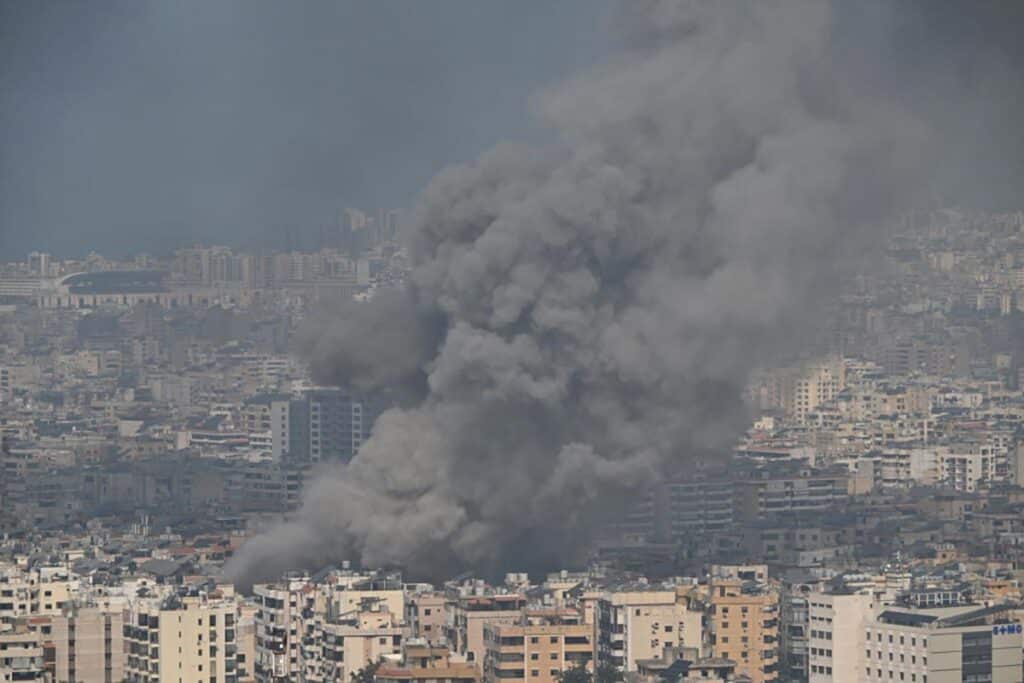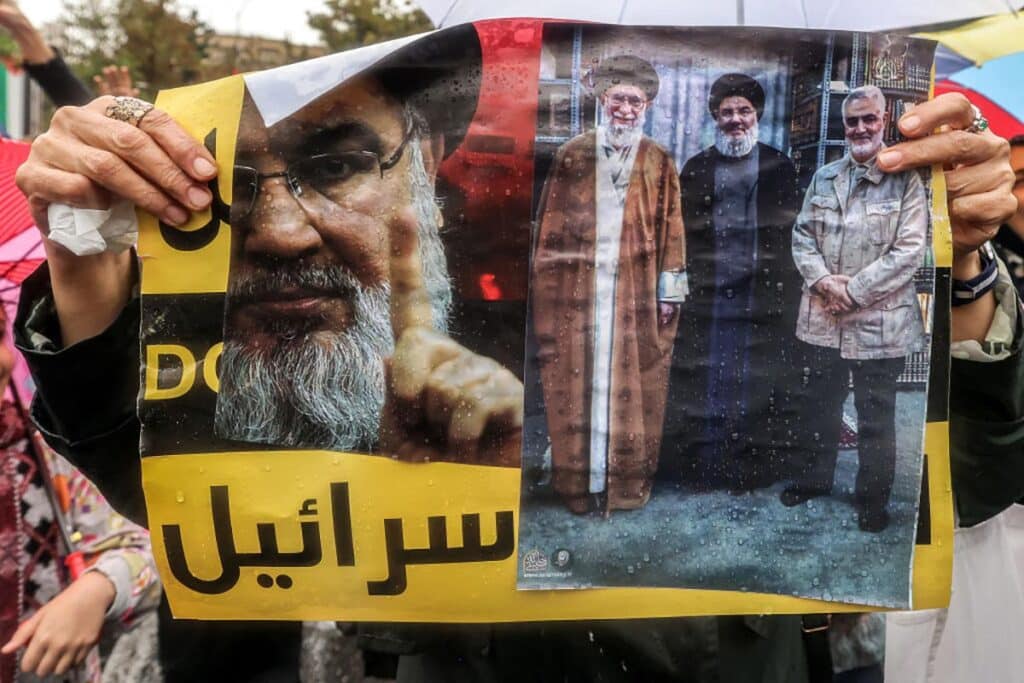
The world was taken by surprise Friday when Israel assassinated Hezbollah Secretary-General Hassan Nasrallah, one of the most senior figures in Iran’s axis of terrorist group.
As Israel and many others celebrate the achievement of removing the threat posed by Nasrallah, the main question, as usual, has become what happens now?
Just a few days after the assassination, it seems that the war against Hezbollah may still have a long way to go.
How we got here
Since Oct. 8, Hezbollah has launched thousands of missiles and drones toward northern Israel, forcing tens of thousands of Israelis to evacuate their homes. Many of these residents still have not been able to return.
Residents of the north recently intensified their calls for an operation against Hezbollah so they can return home safely.
Tensions between Israel and Hezbollah have risen rapidly, with increased pressure placed on the Israeli government to act firmly against the terrorist group.
Two weeks ago, the situation exploded as the IDF launched a large-scale operation to restore security in northern Israel.
The operation began with two attacks that caused Hezbollah’s pagers and walkie-talkies to explode, injuring thousands of people across Lebanon simultaneously.
Those attacks were quickly followed up by a precision strike on the Dahieh suburb of Beirut in which Ibrahim Aqil was taken out. Aquil led Hezbollah’s elite Radwan Force, a unit focused on plans to invade northern Israel.
Hezbollah responded by expanding the range of its rocket fire further south, reaching Haifa and even as far as parts of the West Bank.

Israel responded by expanding its range of operations against Hezbollah, launching repeated waves of airstrikes against homes and other buildings used by the terrorist organization to store weapons.
In Lebanon, the toll of the war has spiked dramatically. Over 700 people have been killed, and tens of thousands have fled their homes due to the fighting.
Within days, thousands of targets had been hit in the operation the IDF has named “Northern Arrows.” Several additional airstrikes have targeted Hezbollah commanders in the Beirut area.
The elimination of Hassan Nasrallah
While the situation was already escalating, a new airstrike on the Dahieh suburb on Friday afternoon took the world by surprise.
The strike was massive, with footage from the scene showing massive plumes of smoke rising from a row of targeted buildings. It quickly became clear that this wasn’t a normal target.
فيديو يظهر لحظة إستهداف الضاحية الجنوبية لبيروت pic.twitter.com/ggBpfgzNBb
— LBCI Lebanon News (@LBCI_NEWS) September 27, 2024
The IDF at first announced that the target was Hezbollah’s central headquarters, located deep underground in the targeted area, but soon, additional reports revealed that the target wasn’t the headquarters but the person inside: Nasrallah.
It took nearly a day, but the IDF and then Hezbollah confirmed that Nasrallah was, in fact, eliminated in the strike.
Who was Hassan Nasrallah?
Hassan Nasrallah took the reins of Hezbollah in 1992 after his predecessor, Abbas al-Musawi, was assassinated in an Israeli airstrike.
Nasrallah worked closely with Iran to greatly improve Hezbollah’s capabilities, stocking the terrorist movement with more powerful missiles that could reach further and cause more damage in Israel.
Israel had entered Lebanon in 1982 in the First Lebanon War to combat Palestinian terrorism in the country, and Israeli forces remained in southern Lebanon for nearly 20 years before withdrawing in 2000.
The fact that Israel withdrew after Nasrallah took power was seen by many in the Middle East as a victory for the Hezbollah leader, who was cast as the figure responsible for ending Israel’s military control of southern Lebanon.
While Israel withdrew to the Blue Line, a line designated by the U.N. as a boundary between the nations, Nasrallah insisted that Israel was still holding areas belonging to Lebanon, providing an “excuse” to continue the conflict even after the withdrawal.
In 2006, Hezbollah, under Nasrallah’s orders, kidnapped and killed several IDF soldiers, sparking the Second Lebanon War. Nasrallah later stated that his decision to launch the war was a mistake and that if he had known that Israel would respond as strongly as it did to the attack he ordered, he wouldn’t have ordered it.
In one of his more unpopular moves, Nasrallah also sent his forces into Syria to help Syrian President Bashar Assad suppress rebel groups in the country’s civil war that erupted in 2011. While Hezbollah was already unpopular across much of the Arab world, the terrorist group’s cruelty against Syrian civilians and protesters greatly increased the outrage.
Nasrallah was noted for his speeches and as a media personality, even though he spent most of the last 20 years underground in a bunker. His speeches, delivered periodically over video, were watched closely by both supporters and opponents.
The Hezbollah leader was also seen as the most senior figure in the “Axis of Resistance,” an alliance of terrorist groups funded and supported by the Islamic regime in Iran. He was extremely close with the supreme leader of Iran, Ali Khamenei. Under his leadership, Hezbollah was seen as the main “shield” deterring Israel and other countries from attacking the Islamic Republic. The thousands of missiles and drones Iran sponsored posed a significant threat to Israel, and Hezbollah’s network of operatives located around the world could be activated to carry out large terrorist attacks.
What does Nasrallah’s elimination mean for Hezbollah and Iran?
Nasrallah’s elimination is a significant blow to both Hezbollah and Iran. He was seen as the main charismatic figure in the Iranian axis. He was often seen as untouchable, partially because he never left his bunker, but also because Hezbollah was expected to launch a significant attack consisting of thousands of missiles and drones if he was ever targeted.
The decision to eliminate Nasrallah sent a clear message to other members of the Iranian axis, such as Hamas leader Yahya Sinwar and even Khamenei himself, that they’re not safe either. Reportedly, security was greatly enhanced around Khamenei soon after Nasrallah was eliminated.

It remains unclear how exactly Hezbollah and Iran will respond to Nasrallah’s death.
On the one hand, Hezbollah is expected to retaliate, but it’s also not in the best position to do so right now. In just a matter of weeks, it lost almost the entirety of its senior military leadership, as well as significant amounts of its missile and drone arsenal.
While Israeli analysts had predicted that in a full-blown conflict with Hezbollah, the terrorist movement would launch thousands of missiles and drones at Israel each day, so far, that hasn’t been the case. The barrages in recent weeks have consisted of a few dozen rockets at most, and in many cases, only one or two rockets.
It may be, however, that Hezbollah doesn’t yet consider this a full-blown conflict and either is saving its arsenal for what it believes is an imminent larger conflict or in the hope that a ceasefire in Gaza will be reached that will allow it to de-escalate.
Iran, in the meantime, has distanced itself from committing to taking part in any response to the assassination. Iran’s Foreign Ministry announced on Monday that it would not be sending forces to Lebanon because the groups it supports “have the capability and strength to defend themselves against the aggression.”
Khamenei also did not make any explicit threats of an Iranian response, in contrast to the explicit threats he did make when Hamas’s former leader, Ismail Haniyeh, was assassinated in Tehran in July.
The war isn’t over yet
While Nasrallah’s loss is a major blow to Hezbollah and Iran and they seem less than eager to respond right now, that doesn’t mean the war is coming to an end.
Hezbollah still poses a significant threat to northern Israel with its arsenal of missiles and drones, but also due to years of training aimed at infiltrating northern Israel in attacks even larger than Hamas’ Oct. 7 massacre.
Residents of the north have insisted that they will not return to their homes until the threat of invasion is removed from the northern border, and that means pushing Hezbollah away from the Lebanese-Israeli border.
While there is a U.N. Security Council resolution (1701) requiring Hezbollah to withdraw northward away from the border, Hezbollah and the government of Lebanon have never taken any action to comply with the resolution since it was passed in 2006.
Instead, Israel will likely have to enter Lebanon in a ground offensive in order to clear out Hezbollah infrastructure and operatives near the border.

Such an operation appeared to be drawing near as of Monday evening, with U.S. officials telling media outlets that there were signs that an offensive could be launched within a matter of hours.
A U.S. official told the Washington Post that the plans involved a limited operation destroying Hezbollah tunnels, rocket launchers, weapons caches, and other infrastructure near the border. “We do not expect it will look like 2006,” said the official.
U.S. President Joe Biden addressed the reports that Israel was planning a limited ground operation on Monday, telling reporters, “I’m more aware than you might know, and I’m comfortable with them stopping. We should have a ceasefire now.”
In recent months, Israeli special forces have already been carrying out small, targeted raids in southern Lebanon to gather intelligence and prepare for a larger operation, according to the Wall Street Journal. The raids included entering Hezbollah tunnels near the border.
Signs of an impending ground operation were also seen in Israel.
On Monday, the IDF announced that the Commanding Officer of the Northern Command, Maj.-Gen. Ori Gordin, together with the Commander of the 36th Division, Brig.-Gen. Moran Omer, the Commander of the 98th Division, Brig.-Gen. Guy Levy, and the Commander of the 91st Division, Brig.-Gen. Shai Klepper, have been “approving plans for the coming days.”
Defense Minister Yoav Gallant told Israeli soldiers in the north Monday that Israel would use “all the capabilities we have,” stressing that they too are “part of this effort,” in what was seen by many as hinting at a ground invasion.
Later in the day, Gallant told local authorities from the north that “The next phase in the war against Hezbollah will begin soon — it will be a significant factor in changing the security situation and will allow us to complete the important part of the war’s goals: returning the residents to their homes”
However, the future of the war may not be limited to Lebanon.
In comments on Monday morning, Prime Minister Benjamin Netanyahu addressed the Iranian people, saying, “Israel stands with you.”
Prime Minister Benjamin Netanyahu:
— Prime Minister of Israel (@IsraeliPM) September 30, 2024
"I speak a lot about the leaders of Iran.
Yet at this pivotal moment, I want to address you – the people of Iran. I want to do so directly, without filters, without middlemen."https://t.co/r6jKRQigQX pic.twitter.com/CMCvOcELbp
“Every day, you see a regime that subjugates you, make fiery speeches about defending Lebanon, defending Gaza. Yet every day, that regime plunges our region deeper into darkness and deeper into war. Every day, their puppets are eliminated. Ask Mohammed Deif. Ask Nasrallah. There is nowhere in the Middle East Israel cannot reach,” Netanyahu said.
“When Iran is finally free and that moment will come a lot sooner than people think – everything will be different,” added the prime minister. “Our two ancient peoples, the Jewish people and the Persian people, will finally be at peace. Our two countries, Israel and Iran, will be at peace. When that day comes, the terror network that the regime built in five continents will be bankrupt, dismantled. Iran will thrive as never before.”
On Monday evening, Israel’s national broadcaster, KAN, reported that the cabinet had approved a secret goal of the war, preventing a broad campaign involving Iran. However, the Israeli government recently changed the goal to: “reduce the possibility that the campaign will turn into an all-out war.” According to the report, the goal was changed because Israel is preparing for a significant expansion of the war, including a clash with Iran.
